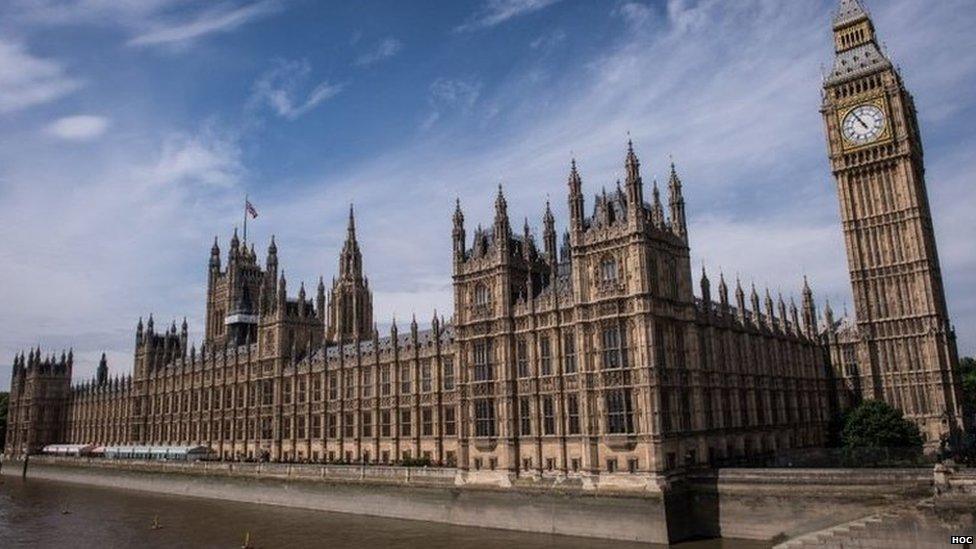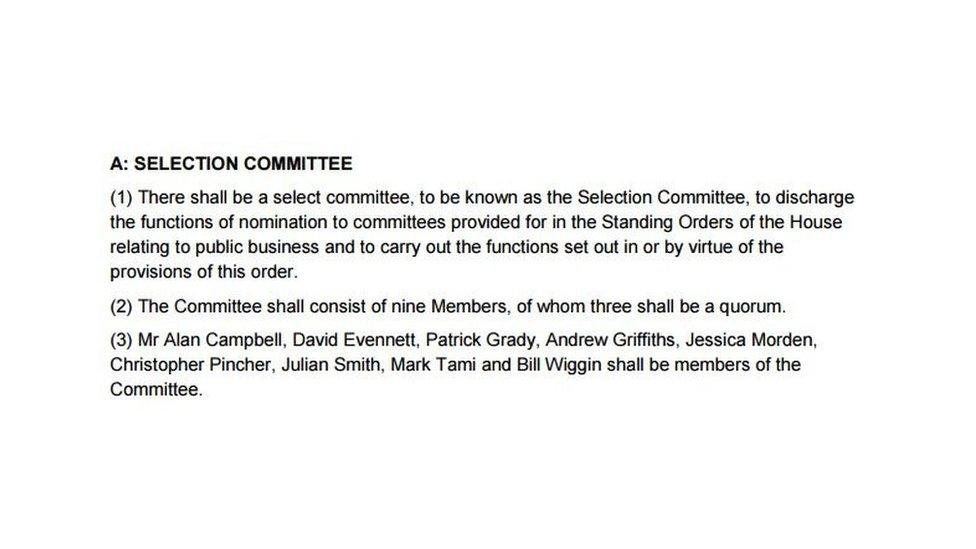Committee conflict prefigures battle to come
- Published
- comments

Tonight's Commons vote on whether the government should be guaranteed a majority on Commons Public Bill Committees is about the Brexit battles to come.
This week, the Commons intakes of 2015 and 2017 have had their first taste of what parliamentary business will be like in the months and years ahead, as a vast body of Brexit legislation has to be passed, before the UK exits the EU.
After a gentle start to this Parliament, the late night votes and complex procedural game-playing seen in recent days will become the new normal - and the government is attempting to foreclose on possible sources of trouble.
The Business of the House motion MPs are due to vote on this evening, external would assign the government a majority on a variety of committees, giving them control of various key moments in the parliamentary process.
First and foremost, the government would have a majority on the new Selection Committee, which will nominate the membership of the Public Bill Committees, external, which do the detailed line-by-line scrutiny of legislation.
Tonight's motion nominates nine MPs to serve on the committee - five of them Conservatives, plus three Labour MPs and one from the SNP, all whips but for the Chair, probably the Conservative Bill Wiggin.

The order paper lists the names of the MPs who are nominated for the Selection Committee
But one nuance of these numbers is that the chair only votes if the committee is tied, so the normal balance is 4-4 with a Conservative casting vote.
If agreed, it would allow the Conservatives to control the numbers on Public Bill Committees (MPs sometimes refer to these by their old title of Standing Committees).
The motion before the Commons provides that there would be equal numbers between the government and Opposition where a bill committee had even numbers of members; and a government majority where it had odd numbers - this last bit is the part of the motion which has no precedent…
And this is the bit which would probably be deployed to bolster the government's position in the committees dealing with really critical measures.
Importance of the chair's role
Meanwhile, in evenly-balanced committees, the role of the chair still tilts the balance in favour of the government - because in the event of a tied vote, the chair votes to keep the bill in the form in which it entered the committee, so they would vote against any amendment. (This mirrors the way the Speaker's casting vote is deployed in the Chamber, in the event of a tied vote there).
What the government appears to be worried about is the prospect of its legislation being heavily amended by Opposition MPs, if it does not control Public Bill Committees - forcing it to spend precious Commons debating time undoing those amendments, when the bill in question returns to the Chamber for report stage consideration.
And there would also be a serious worry about Delegated Legislation Committees, external (also chosen by the Committee of Selection) forcing the Commons to debate important Brexit-related secondary legislation. If the Opposition runs wild, the argument goes, the whole legislative programme could be bogged down.
But, senior Conservatives add, it is a rather theoretical worry, because there is no precedent for a government not taking a majority on bill committees, even a minority government.
The minority Labour governments of the mid-1970s provide the only recent precedent; during the brief February-October 1974 Parliament, when there was a minority Labour administration under Harold Wilson, the Committee of Selection still had a Labour majority, and proceeded to nominate bill committees with equal numbers of government and Opposition MPs, but, crucially, with a Labour chair - allowing their government to win on their casting vote.
Rooker-Wise amendment: lesson from history
The Labour government of November 1974-April 1979 had a narrow majority when it started, but saw it eroded away by by-elections and defections - but it continued to use control of the Committee of Selection to nominate standing committees with a government majority, except for a brief period when the Labour Chairman of the Committee of Selection, Hugh Delargy, external, died suddenly.
This put Labour into a minority on the committee, because another Labour member took the chair, but was then restricted to only voting when it was tied. A deal was eventually done - and Labour continued to give itself a majority on bill committees, but only via that vital chair's casting vote, for the remainder of that Parliament.
It is worth recalling that this is the context in which the famous "Rooker-Wise" amendment, external arose. This is the now-legendary amendment, put by two Labour backbenchers on a bill committee for a Finance Bill, which re-wrote a Labour budget, with Conservative backing.
At the time it was seen as a terrible humiliation for the government, but also as a virtuoso exercise of backbench power in a hung Parliament.